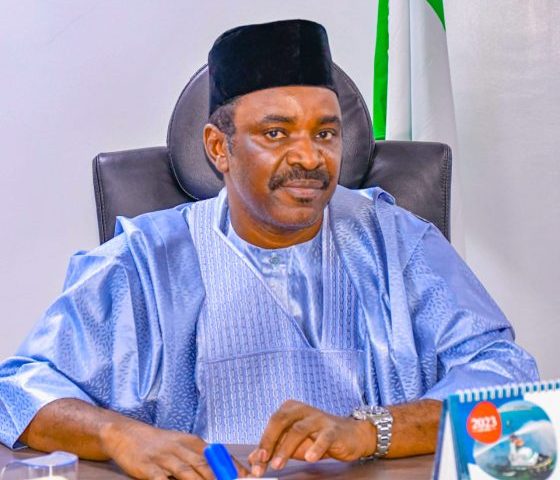
Alkali also described the transportation sector as a major contributor to environmental pollution due to its over-dependence on fossil fuels and non-availability of alternative energy.
The minister disclosed that bearing in mind the health hazard posed by this disturbing trend, part of the Renewed Hope Agenda of the President is to change the narrative by adopting clean, renewable energy and other innovations that could help modernise the transportation sector.
Alkali also revealed that the drafting of the National Land Transport Policy which dealt extensively with components such as alternative energy and climate change, among others, has reached 80 per cent completion and will soon be presented to the Federal Executive Council for approval.
The minister spoke on Friday during the closing of the week-long 18th National Council on Transportation held at the June 12 Cultural Centre, Kuto, Abeokuta, Ogun State capital.
The one-week programme had in attendance Commissioners for Transportation from the 36 states of the federation and their Permanent Secretaries.
Alkali described this year’s theme, ‘Embracing Innovations and Technologies for Sustainable Transportation: Tackling the Energy Challenges,’ as a wake-up call to accept innovations to cushion the effect of energy challenges currently being experienced in the country while also serving as an eye-opener to mitigate some climate change concerns
He said, “Transportation sector is a major culprit of environmental pollution because of its over-dependence on fossil fuel and non-availability of alternative energy that has exerted pressure on demand for energy and raised broader environmental and socio-economic issues such as environmental pollution; fuel price volatility; economic sabotage among others.
“In view of the energy demand of transportation, countries at the recently concluded World Climate Action Summit (WCAS) of the 28th Conference of Parties (COP 28), committed to creating a sustainable future for coming generations by accelerating innovation and facilitating the deployment of renewable energy, clean technology and other green alternatives.”
Alkali said that for Nigeria to be at the forefront of this crusade, there is a need to adopt a multifaceted approach to accelerate the adoption of sustainable and environmentally-friendly transportation solutions.
Some of these solutions he identified include, “Modernising the country’s transportation systems by pioneering the frontier of green manufacturing and industrialization with a focus on natural gas as a transition fuel alongside other renewable energy sources
“Prioritising innovative technologies in the transportation sector to mitigate energy challenges while promoting sustainability and economic growth
“Consciously prioritizing budgetary appropriation to tackle energy challenges and creating incentives to attract private sector investments in de-carbonization and other alternative technology among others.”
He, however, said that the Ministry of Transportation has carried out some notable technological advancements that will foster environmentally and economically-friendly transportation solutions in Nigeria.
Alkali said some of the bold moves of the Ministry in recent times include “collaborating with the Presidential CNG Initiative Committee to set up a CNG Conversion Centre in Abuja to mitigate the effect of subsidy removal on petrol
“Promoting the Adoption of Electric and Autonomous Vehicles; Advocating the Integration of Artificial Intelligence (AI) for logistics operations as well as the development of a National Land Transport Policy which dealt extensively on components such as alternative energy, climate change, etc.”
Alkali lauded Governor Dapo Abiodun for promoting multimodal transport and championing the course of e-mobility and Gas Mobility Projects all of which he said reflected the seriousness the governor attached to implementing the Renewed Hope Agenda of President Tinubu.
In his remark at the occasion, the governor who was represented by his deputy, Noimot Salako-Oyedele, described the transportation sector as one sector which plays a pivotal role in the sustainable growth and development of any society.
Abiodun said that it was in recognition of this that his administration, at its inception, took the giant stride to create a fully professionalised Ministry of Transportation charged with the efficient and effective utilisation of available human and financial resources to provide improved, safe, reliable, accessible, and sustainable mobility options for citizens, visitors and businesses.
He said that aside from his administration’s investment in the ongoing Gateway Agro-Cargo Airport at Ilisan Remo as well as the construction of over 500km of access roads, the state is also planning to extend the Lagos Red, Blue and Purple Line Metro rail services into Ogun State as well as, the East-West Rail Project of the Federal Government
He said in anticipation of the FG’s deregulation policy and total withdrawal of subsidies on petroleum products, “Our state, in late 2022, proactively initiated the diesel-to-CNG conversion mechanism for public transport buses.
“This move made Ogun State the flagship of the diesel-to-CNG conversion programme in the country. It would please you to know that all our previously acquired diesel-powered buses have been successfully converted to CNG and are presently deployed for phased bus mass transit services across the state reporting a 40% reduction in operating costs.”
Abiodun said that his administration would continue to collaborate with the NCT, neighbouring states, development partners like the UK-Nigeria Infrastructure Advisory Facility and multilateral institutions like the World Bank. to actualise the vision for a seamless multimodal transportation system in Nigeria.





